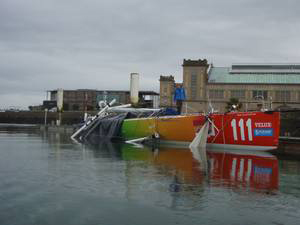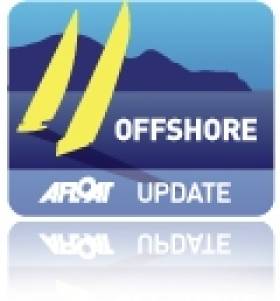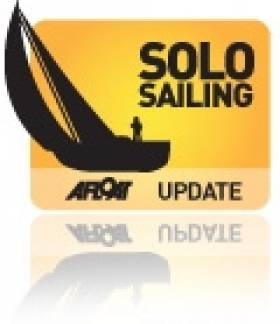Displaying items by tag: Christophe Bullens
Five Oceans of Smile Too Arrives in Cape Town
Christophe Bullens celebrates his arrival in Cape Town as he finishes the first Ocean Sprint of the Velux 5 Oceans, from La Rochelle onboard his boat Five Oceans of Smiles Too.

Five Oceans of Smiles Too Photo: Ainhoa Sanchez/w-w-i.com
The former Belgian national sailing champion and tank commander in the Belgian army, now runs a yacht charter business. Christophe's boat is named Five Ocean of Smiles after the Smiles charity, which supports 'children who are HIV positive.
The Velux 5 Oceans is the oldest single-handed round the world yacht race which was first held in 1982. The race is the longest and toughest event for any individual in any sport. The race is a series of five ocean sprints within a marathon circumnavigation that covers a 30,000 mile route. The race started in France at La Rochelle with the first leg ending in Cape Town. The following stages go on to Wellington, Salvador, Charleston and back to La Rochelle for the finish.
Bullens in Five Oceans Race Pitstop
The mainsail on Five Oceans of Smiles too was ripped, three sail battens were broken and a runner - one of the wires that hold up the mast - was caught under the yacht's rudders. Christophe is now en route to Las Palmas on Gran Canaria where he will make repairs before setting sail again for Cape Town.
"Everything was going well, I was sailing at 16 knots and then voila, my boat was knocked flat twice," Christophe said this morning. "As I was approaching Fuerteventura the wind got strong and with the mountains it was very turbulent. The boat altered course and was knocked flat twice. The problem is that the mainsail was ripped, three battens were broken and a runner got caught under one of the rudders. I am still travelling at 10 knots but the seas are too big and there is too much wind so I have to stop."
He added: "I hope to set sail again tomorrow afternoon at the latest. The goal is really to arrive as quickly as possible in Cape Town to sort the boat out and be ready for the second leg."
It is the latest in a long line of problems for Christophe, whose original yacht Five Oceans of Smiles was dismasted just weeks for the start of the 30,000-mile round the world race as he was sailing to the start port of La Rochelle, France. Christophe managed to buy a new Eco 60 yacht, formerly Artech, a few days before the start of the race on October 17 and after crossing the start line with the rest of the fleet he returned to La Rochelle for five days to complete his preparations.
Since restarting he has been plagued with light winds and onboard problems including a fuel spill, a leaking hull and no electrics onboard Five Oceans of Smiles too to power his navigational instruments. Christophe is more than 2,000 nautical miles behind race leader Brad Van Liew, who is now off the eastern coast of Brazil being chased hard by Polish sailor Zbigniew Gutkowski.
The VELUX 5 OCEANS, run by Clipper Ventures PLC, is the longest running solo round the world race, and has 28 years of rich heritage as the BOC Challenge and then the Around Alone. This edition features five ocean sprints over nine months. After leaving from La Rochelle on October 17th the fleet now head to Cape Town, the race will then take in Wellington in New Zealand, Salvador in Brazil and Charleston in the US before returning back across the Atlantic to France.
Belgian Determined to Make Start Line despite Dismasting
Belgian solo sailor Christophe Bullens was dismasted this morning off the coast of France en route to the start of the Velux 5 Oceans.
The 49-year-old skipper had been sailing his Eco 60 class yacht Five Oceans of Smiles in 18-knot winds and choppy seas 15 miles from the Normandy coast when disaster struck.Christophe was down below with another crewmember while two more crew were on deck. They then heard a snapping noise, thought to have been one of the mast's shrouds breaking. Christophe raced on deck and saw the mast snap in two places. All four crew were able to react in time to avoid the falling mast and no-one was injured.The sails and rigging ended up under the boat, blocking the propeller. CROSS Jobourg, the regional centre for maritime surveillance and safety, dispatched a rescue boat from Cherbourg to aid Five Oceans of Smiles.

It took more than two hours to prepare Five Oceans of Smiles for the tow back to Cherbourg, which then took three hours.
The dismasting caused serious damage to the starboard side of Five Oceans of Smiles including a hole in the hull by the ballast tanks. The sails are beyond repair. Christophe had been on his way to La Rochelle, home of the 30,000-mile solo ocean race which starts on October 17. The dismasting comes just weeks after he completed a gruelling 2,500-mile qualifying passage from Plymouth in the UK to the southern tip of Ireland then round the Azores off Portugal. During the passage Five Oceans of Smiles was tested in a wide range of weather conditions from strong winds and big seas to light airs. On Christophe's arrival back to Belgium Five Oceans of Smiles' rigging was thoroughly inspected. Earlier this week parts of the rigging were completely replaced. "Nothing is finished," Christophe said after reaching Cherbourg. "I will do everything to be on the startline in La Rochelle on the 17th of October."Christophe's Team Sapphire, aided by the VELUX 5 OCEANS race management team, are now doing all they can to ensure Christophe makes the start of The Ultimate Solo Challenge.






























































